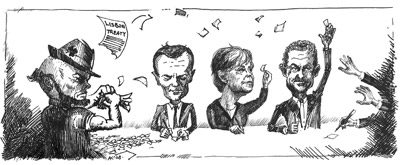Disfunction in the Union
Amidst the political chaos that arose from the rejection of the Lisbon Treaty by Irish voters last month, Poland is caught in suspense as the EU presses on. Though ratified by the Polish parliament in April, the treaty still awaits the signature of President Lech Kaczynski.
Designed to address the addition of 12 members since 2004, the Lisbon Treaty replaces the EU draft constitution, which failed because of rejection by French and Dutch voters in 2005. At this point, 19 of the 27 EU member states have approved the Lisbon Treaty, but the remaining countries must ratify it in order to take effect.
Nevertheless, despite the negative result of the Irish referendum, EU leaders urge ratification to continue. The approach treats Ireland, the only member state to require a referendum on Lisbon, as a problem to be isolated so as to limit further difficulties. Consequently, tremendous pressure is placed on Ireland and the rest of the bloc.
French President Nicholas Sarkozy stated it is impossible for the EU to expand without the Lisbon Treaty. German Chancellor Merkel concurs, adding that the current Nice Treaty limits the Union to 25 countries. As a champion of Ukraine?s future accession, Polish Prime Minister Donald Tusk objects, arguing that ?Lisbon Treaty adoption facilitates EU enlargement plans but the failure to ratify it does not shatter the plans.?
Since it is unlikely that the original target date of January 1st will be met, a proposal was made to force Ireland to ratify the treaty by next March, in time for the European Parliamentary elections in June 2009.
Irish Prime Minister Brian Cowen stated that Ireland needs time to analyse the vote and explore options. A report on the reasons for the outcome and a plan on ways to proceed are expected to be delivered at an EU summit in October.
Tusk, who strongly upholds the signing of the document, believes that the treaty is still valid and that Europe will find a way to bring it to life. According to Tusk, Poland will not be among the countries that will press Ireland. “If we begin to forcefully speed up the process, we will not achieve the desired effect,” said Tusk.
Diplomats already expect complications in the Czech Republic and Poland, where both presidents are recognised eurosceptics. Though Ireland is the only EU country to have rejected ratification, its decision has greatly affected fellow member states, making those countries that have yet to approve the treaty hesitant to proceed.
Czech President Vaclav Klaus declared the treaty dead after the Irish “No” vote. In addition, the constitutional court has been asked by the senate to judge whether it is in accordance with the Czech constitution. Similarly, Poland is delaying ratification, first due to a major dispute between the Law and Justice (PiS) party and the Presidential Palace, and now doubt over whether President Kaczynski will in fact sign the treaty.
On the other hand, a poll carried out by Dziennik shows that over 70 percent of Poles support the Lisbon Treaty. Other sources indicate that the huge population of Poles living and working in Ireland is divided on the matter.
Behind this “crisis” appears a general lack of awareness of treaty contents, leading to uninformed slogans, which raise fears and concerns over issues completely unrelated to the treaty.
Many politicians base their decisions on summaries of the treaty instead of reading it themselves. Even European Commissioner Charlie McCreevy admitted that he would not expect ?any sane and sensible person? to read the Lisbon Treaty in its 200-plus page entirety. France, which takes over presidency from July 1st, will base its actions on existing treaties, unaffected by the Irish vote.

